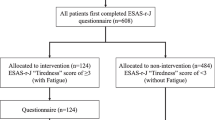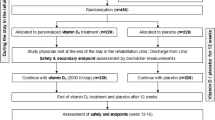Abstract
Objective
To observe the effect of mild moxibustion on cancer-related fatigue, serum ghrelin and adiponectin in patients undergoing chemotherapy after colorectal cancer surgery.
Methods
Seventy patients were divided into a control group and an observation group according to the random number table method, with 35 cases in each group. Patients in both groups were treated with conventional FOLFOX4 chemotherapy regimen. Patients in the control group also received routine treatments such as symptomatic treatment of complications, health education, nutritional support, and exercise intervention. Patients in the observation group received mild moxibustion on the basis of interventions used in the control group. The Piper fatigue scale-revision (PFS-R), Karnofsky performance status (KPS) and spleen and kidney yang deficiency syndrome were scored, and serum ghrelin and adiponectin levels were measured before and after treatment.
Results
After treatment, total score of PFS-R in the control group did not change significantly (P>0.05), while in the observation group it was significantly reduced (P<0.05) and lower than that in the control group (P<0.05); KPS scores in both groups were increased (both P<0.05), and it was significantly higher in the observation group than in the control group (P<0.05); total score of spleen and kidney yang deficiency syndrome in the control group did not change significantly (P>0.05), while it was significantly reduced in the observation group (P<0.05) and lower than that in the control group (P<0.05); serum ghrelin and adiponectin levels in the control group had no significant changes (both P>0.05), but the levels were significantly increased in the observation group (both P<0.05) and higher than those in the control group (both P<0.05).
Conclusion
Based on the routine treatments, mild moxibustion can relieve fatigue, improve quality of life, and improve the symptoms of spleen and kidney yang deficiency in patients undergoing chemotherapy after colorectal cancer surgery, which may be related to the regulation of serum ghrelin and adiponectin levels.
【摘要】
目的: 观察温和灸对大肠癌术后化疗患者癌因性疲乏, 血清胃促生长素及脂联素的影响。方法: 将70例患者根据随机数字表法分为对照组和观察组, 每组35例。两组患者均均采用常规FOLFOX4化疗方案。对照组同时接受并发症对症治疗, 健康教育, 营养支持, 运动干预等常规治疗。观察组在对照组干预基础上加用温和灸。治疗前后进行Piper疲乏修订量表(PFS-R), 卡氏体力状态(KPS)及脾肾阳虚证候评分, 测定血清胃促生长素及脂联素水平。结果: 治疗后, 对照组PFS-R总分无明显改变(P>0.05), 观察组PFS-R总分明显降低(P<0.05), 且低于对照组(P<0.05); 两组KPS评分均升高(均P<0.05), 观察组KPS评分明显高于对照组(P<0.05); 对照组脾肾阳虚证候总分无明显变化(P>0.05), 观察组脾肾阳虚证候总分明显降低(P<0.05), 且低于对照组(P<0.05); 对照组血清胃促生长素和脂联素水平均无明显变化(均P>0.05), 观察组血清胃促生长素和脂联素水平均明显升高(均P<0.05), 且高于对照组(均P<0.05)。结论: 常规治疗基础上加用温和灸可缓解结肠直肠肿瘤术后化疗患者的疲乏程度, 提高生存质量, 改善脾肾阳虚症状, 这可能与其调节血清胃促生长素和脂联素水平相关。
Similar content being viewed by others
References
Li ZS. The effect of Jianpi Yishen Buqi decoction on immune function and cancer-related fatigue in postoperative patients with colorectal cancer. Jiangxi Zhongyiyao Daxue Xuebao, 2019, 31(4): 43–45.
Chen PY, Wang XL, Wang YM. Observation on the effects of different doses of oxaliplatin chemotherapy regimen for treatment of colorectal cancer and the adverse reactions in the nervous system. Zhongliu Yanjiu Yu Linchuang, 2018, 30(2): 110–113.
Ebede CC, Jang Y, Escalante CP. Cancer-related fatigue in cancer survivorship. Med Clin North Am, 2017, 101(6): 1085–1097.
Mohandas H, Jaganathan SK, Mani MP, Ayyar M, Rohini Thevi GV. Cancer-related fatigue treatment: an overview. J Cancer Res Ther, 2017, 13(6): 916–929.
Wang TT, Chen ZL, Chen B, Li MY. Clinical research progress of acupuncture and moxibustion on nausea and vomiting after chemotherapy. Liaoning Zhongyiyao Daxue Xuebao, 2018, 20(1): 73–76.
Gu YJ, Quan CF, Chen XJ. Clinical research on acupuncture combined with acupoint sticking in the treatment of stagnation of blood stasis type of cancer pain. Zhongyi Xuebao, 2017, 32(12): 2307–2310.
National Health and Family Planning Commission Medical Administration Bureau, Chinese Medical Association Oncology Branch. Chinese guidelines for diagnosis and treatment of colorectal cancer (2015 edition). Zhonghua Weichang Waike Zazhi, 2015, 18(10): 961–970.
Health Statistics Information Center of the Ministry of Health, Peking Union Medical College Hospital World Health Organization Disease Classification Collaborating Center. International Classification of Diseases (ICD-10) Application Guide. Beijing: Peking Union Medical College Press, 2001: 1021.
Ministry of Health of the People’s Republic of China. Guiding Principles for Clinical Study of New Chinese Medicines. Beijing: China Medical Science Press, 2002: 385–387.
Fang JQ, Wang FC. Techniques of Acupuncture and Moxibustion. Beijing: People’s Medical Publishing House, 2012.
Liu WW. Clinical observation of Guipi decoction in the treatment of gastrointestinal cancer-induced fatigue. Quanke Kouqiang Yixue Zazhi, 2018, 5(36): 187–188.
Xie BY. Clinical Observation on the Effect of Wheat Grain Moxibustion for Non-small Cell Lung Cancer Cancer-related Fatigue Relevant to Chemotherapy. Guangzhou: Master Thesis of Guangzhou University of Chinese Medicine, 2017.
O’Higgins CM, Brady B, O’Connor B, Walsh D, Reilly RB. The pathophysiology of cancer-related fatigue: current controversies. Support Care Cancer, 2018, 26(10): 3353–3364.
Bower JE. Cancer-related fatigue—mechanisms, risk factors, and treatments. Nat Rev Clin Oncol, 2014, 11(10): 597–609.
He GL. Clinical Observation of Warming and Tonifying the Spleen and Kidney Therapy on Colorectal Cancer-related Fatigue During the Chemotherapy Period. Nanjing: Master Thesis of Nanjing University of Chinese Medicine, 2019.
He GL, Cheng HB. Discussion of warming and tonifying spleen and kidney therapy for colorectal cancer-related fatigue. Zhongyi Zhongliuxue Zazhi, 2019, 1(3): 59–62.
Yang LH, Wang M, Zhou T, Zhou J, Hu KW. Discussion on moxibustion for treating cancer-related fatigue based on the theory of ‘moxibustion treatment for major diseases’. Zhongyi Zazhi, 2019, 60(14): 1194–1197.
Sjögren M, Duarte AI, McCourt AC, Shcherbina L, Wierup N, Björkqvist M. Ghrelin rescues skeletal muscle catabolic profile in the R6/2 mouse model of Huntington’s disease. Sci Rep, 2017, 7(1): 13896.
Malik JS, Yennurajalingam S. Prokinetics and ghrelin for the management of cancer cachexia syndrome. Ann Palliat Med, 2019, 8(1): 80–85.
Ma CC, Li Y, Pang XP, Lou TT, Wang H, Guo RF, Liu YH. Changes and correlation analysis of serum leptin and adiponectin expression in patients with gastric and colorectal cancer. Zhongliu Daixie Yu Yingyang Dianzi Zazhi, 2018, 6(3): 351–356.
Acknowledgments
There was no project-fund supporting for this study.
Author information
Authors and Affiliations
Corresponding author
Additional information
Author: Luo Qian, bachelor, nurse.
Conflict of Interest
There is no potential conflict of interest in this article.
Statement of Informed Consent
Informed consent was obtained from all individual participants.
Rights and permissions
About this article
Cite this article
Qian, L., Jia-quan, C. Effect of mild moxibustion on cancer-related fatigue, serum ghrelin and adiponectin in patients undergoing chemotherapy after colorectal cancer surgery. J. Acupunct. Tuina. Sci. 19, 200–205 (2021). https://doi.org/10.1007/s11726-021-1246-8
Received:
Accepted:
Published:
Issue Date:
DOI: https://doi.org/10.1007/s11726-021-1246-8
Keywords
- Moxibustion Therapy
- Moxa Stick Moxibustion
- Drug Therapy
- Drug-related Side Effects and Adverse Reactions
- Colorectal Neoplasms
- Fatigue
- Ghrelin
- Adiponectin




